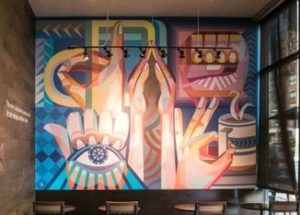 The language barriers that deaf people have always faced are beginning to come down. Around the world, businesses and organizations are beginning to open their doors to the hearing impaired like never before.
The language barriers that deaf people have always faced are beginning to come down. Around the world, businesses and organizations are beginning to open their doors to the hearing impaired like never before.
A Sign Language Café in Pakistan
There’s a café in Pakistan where you can order your food using sign language. The mother, father, and brothers of the family that own the café are hearing impaired. Deaf customers can come in, order by sign language, and be served a variety of tasty foods, including the café’s special-recipe double chocolate brownies.
An Uber App for Deaf Drivers
Uber has been working with the National Association of the Deaf (NAD) to create a new app for deaf Uber drivers. The old app, with audible notifications, wasn’t helpful for drivers who couldn’t hear the beeps.
The new app uses flashing lights so that deaf drivers can see the messages and respond. As the driver makes their way to the rider, the rider gets a notification that their driver is deaf, and they’re prompted to enter their trip information before the driver reaches them. The app is only available for drivers in four U.S. cities, but Uber says it will be rolled out more widely soon.
A Starbucks Signing Store
Starbucks’ new Signing Store in Washington, D.C. is a coffee shop where the baristas communicate with their customers using ASL. The store not only benefits deaf customers, but it also brings employment opportunities for deaf people in the area.
Baristas at the location communicate with sign language. They also take orders using specially designed digital displays and ordering technology that uses two-way keyboards. What’s more, the Signing Store celebrates deaf culture with a mural created by deaf artist Yipiao Wang.
An Austrian Language Class for Deaf Refugees
When refugees arrived in Austria in 2015-2016, there were deaf people among them. An organization in the country saw an opportunity to help them thrive there. They began offering a unique language class for asylum seekers.
In this class, refugees who are hearing impaired learn sign language and written German, but it’s more than a language class. They also learn about the cultural norms in Austria so that they understand how they’re expected to behave at work and in the community. They learn practical skills, too, like how to fill out job forms.
These organizations and others are finally recognizing that deaf people need equal treatment and equal access. While it’s hard to say just how far and how fast this trend will go, it’s a step in the right direction. Regardless of what happens, interpreters will continue to play a role in serving the deaf community.
As a language services provider, you’re a part of the solution. Contact us at Interpreter Intelligence to learn how our platform makes interpreter scheduling easier and more reliable.

I agree with your point of view, your article has given me a lot of help and benefited me a lot. Thanks. Hope you continue to write such excellent articles.